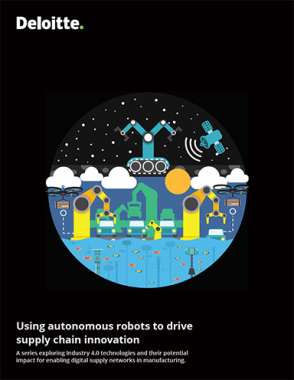Blockchain in Supply Chain Continues to Mature
Companies are seeing benefits from using blockchain to track assets and automate contracts
Much like artificial intelligence rules the news cycle today, blockchain was once the most-hyped supply chain-saving technology to have emerged. It promised to change how companies do business by increasing trust and collaboration among partners and creating a more efficient, safer, and transparent supply chain. Now, looking at the technology five years later, you have to wonder where are we?
According to Deloitte’s 2020 Global Blockchain Survey, the technology went from promising in 2019 to reality the following year. The survey found that business leaders today consider the technology integral to organizational innovation, with 55% of Deloitte’s senior executive and practitioner respondents viewing blockchain as a top priority.
“Blockchain has followed a very typical pattern,” says Paul Brody, Ernst & Young’s global blockchain leader. “For a lot of emerging technologies, there’s a hype cycle. People get excited about it, they become unrealistically enthusiastic about what it can do, and then when reality hits things tend to sort of collapse. We’re now sort of on our way back out from that reality-driven collapse.”
The two major problems with the blockchain technology of five years ago were scalability and privacy. Innately, blockchain was not built to handle hundreds of millions of transactions a day, while at the same time it didn’t handle the confidentiality required in a typical business environment. These concerns have since been worked out, but they still are seen as major deterrents for widespread adoption.
“Blockchain has followed a very typical pattern. For a lot of emerging technologies, there’s a hype cycle. People get excited about it, they become unrealistically enthusiastic about what it can do, and then when reality hits things tend to sort of collapse. We’re now sort of on our way back out from that reality-driven collapse.”
“No company wants to tell their competition what they’re buying and how much they’re paying and who they’re buying it from,” says Brody. “It’s taken five or six years to really grind through solving these problems of privacy and scalability, and now that that’s happened, blockchain is ready for a happier day in the sun.”
Top use cases for blockchain in supply chain
There are many benefits to adopting blockchain-backed supply chain solutions, but two use cases are already making a real-world impact for businesses across various sectors.
The most compelling of these is for product and asset traceability. When using blockchain technology to track shipments, data is both private and streamlined in ways unavailable when using traditional “off-chain” methods.
Turns out blockchain excels at keeping track of items because of what Brody calls “the no double spend rule.” This rule, which is built into the system by design, prevents users from duplicating an item.
“If I define a piece of inventory, I can basically apply the same level of rigor to any business asset or digital asset that a bank would do to money, which is to say, ‘Make sure that you always are reconciled and you never duplicate it,’” says Brody.
This allows for a more efficient and faster delivery of products with far fewer errors, thanks to increased transparency by all partners. And while mistakes can still happen, if you do have an error, it’s easier to define where it came from and quickly fix it.
The second way blockchain is being used today is for business contract automation, which uses smart contracts to take a business relationship between two companies and automate it.
“Companies are good at negotiating deals with each other; they’re very bad at keeping track of the details of the deal,” says Brody. “The beauty of smart contracts is they just keep track automatically. So, every time I make a purchase order, the smart contract looks at our history, how much I bought, what the rules are for a particular contract, and enforces them automatically.”
For example, Brody worked with Microsoft to build a smart contract tool for its Xbox video game system. The tool converted all Xbox purchasing contracts from traditional systems to blockchain-based smart contracts, taking the time required at the end of each month to process all the account statements from 45 days down to four minutes.
“Over time, my own expectation is that blockchain becomes the glue for pretty much any kind of business-to-business contract,” says Brody. “But I think the ones that are going to be most appealing early on are the ones that are focused on business smart contracts with supply chain integration or physical asset integration that makes keeping track of those assets valuable and important.”
Article Topics
Deloitte News & Resources
MHI Report: Investment increases as supply chains become more tech-forward and human-centric Global Trade Tensions, Material Shortages Not Expected to Ease in 2024 Blockchain in Supply Chain Continues to Mature Supply Chains Struggle to Access Reliable Emissions Data from Suppliers State of the industry: MHI releases annual report at ProMat 2023 MHI and Deloitte launch 2023 Annual Industry Report survey How Amazon Is Preparing For Fully-Electric Drone Delivery More DeloitteLatest in Transportation
A Look at Baltimore’s Key Bridge Collapse—One Month Later Baltimore Continues Bridge Recovery With Opening of New Channel How Shippers Can Prep for Hurricane Season UPS Struggles in First Quarter With Steep Earnings Decline FedEx Announces Plans to Shut Down Four Facilities The Two Most Important Factors in Last-Mile Delivery Most Companies Unprepared For Supply Chain Emergency More TransportationAbout the Author















